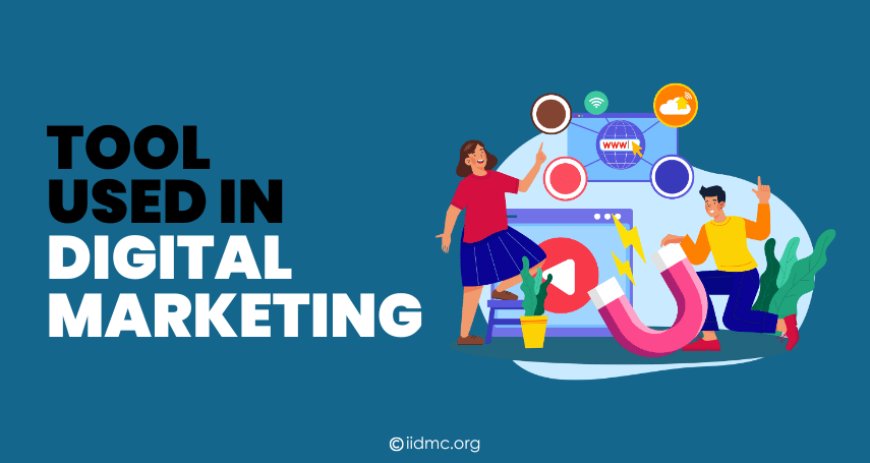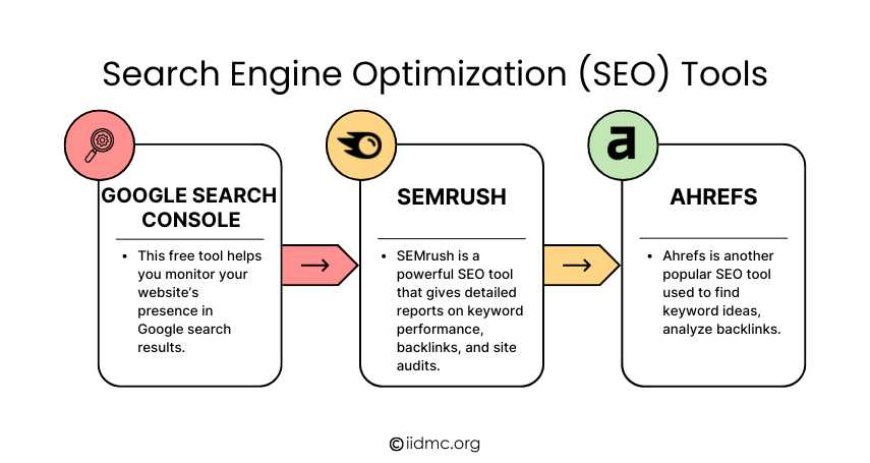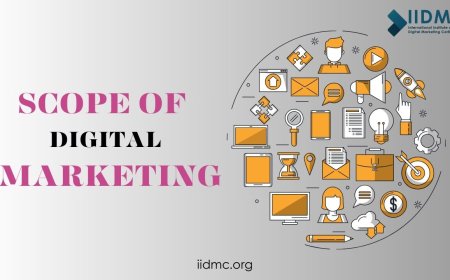What Tool is Used in Digital Marketing?
Learn the key tools behind strong digital marketing, explained in simple terms to help grow your business and improve your online presence.

Growing a business online isn’t about doing everything; it’s about doing the right things with the right tools. I've worked with different types of businesses over the years and have observed what truly makes a difference. A solid digital marketing strategy is always at the core.
Whether you're running a small business, studying marketing, or just exploring the space, understanding the key tools can make a huge difference. I'm here to simplify them based on experience; there won't be any technical terms, just the key points that are effective and important.
What is Digital Marketing?
Digital marketing is the process of promoting and selling products or services through online platforms. Websites, social media sites, email marketing, search engines, and other digital technologies are all part of this strategy. Reaching more people, creating awareness, increasing traffic, and turning visitors into customers are the goals.
Marketers use a variety of tools to ensure that everything goes properly. These tools support the planning, executing, and evaluating of digital marketing campaigns. Let’s look at these tools one by one.
Website and Content Management Tools
WordPress
WordPress is one of the most popular tools for creating and managing websites. It is easy to use and allows users to create blogs, business sites, and eCommerce stores.
Wix and Squarespace
These are beginner-friendly website builders. You don’t need to know how to code. They come with drag and drop features, making it easy to design professional websites.
Content Management Systems (CMS)
CMS platforms like Joomla and Drupal also help in managing digital content. They are useful when you have a lot of content to organize and publish.
Search Engine Optimization (SEO) Tools

Google Search Console
This free tool helps you monitor your website’s presence in Google search results. You can check how many people are visiting your site, which keywords are working, and if there are any issues.
SEMrush
SEMrush is a powerful SEO tool that gives detailed reports on keyword performance, backlinks, and site audits. It also helps in tracking what your competitors are doing.
Ahrefs
Ahrefs is another popular SEO tool used to find keyword ideas, analyze backlinks, and see what content is performing best in your industry.
Social Media Marketing Tools
Buffer
Buffer allows you to schedule posts for Facebook, Twitter, Instagram, and LinkedIn. It saves time by letting you plan content in advance.
Hootsuite
Similar to Buffer, Hootsuite offers social media scheduling but also gives detailed reports and helps manage all your social media messages in one place.
Canva
Canva is a design tool that helps you create beautiful social media posts, banners, and infographics. You don’t need design experience to use it.
Email Marketing Tools
Mailchimp
Mailchimp is easy to use and helps you send newsletters, automate emails, and track performance. It’s great for beginners.
Constant Contact
Another beginner-friendly email tool that offers templates, contact management, and analytics.
ConvertKit
ConvertKit is mostly used by bloggers and creators. It allows you to create email sequences and segment your audience.
Pay-Per-Click (PPC) Advertising Tools
Google Ads helps you show ads to people searching for products or services like yours. It works on a pay-per-click model, meaning you only pay when someone clicks on your ad.
Facebook Ads Manager
This tool is used to run ads on Facebook and Instagram. You can target specific groups based on location, interests, age, and more.
Microsoft Ads
Similar to Google Ads, but for Bing. It can be cheaper and still reach a good audience.
Analytics and Reporting Tools
Google Analytics
Google Analytics shows you who visits your website, what they do, and how they found you. It helps you understand what’s working and what’s not.
Hotjar
Hotjar offers heatmaps and session recordings to show where users click and how they move on your site. This helps in improving user experience.
Data Studio
Google Data Studio helps you create visual reports using data from different sources like Google Analytics, Search Console, and more.
Customer Relationship Management (CRM) Tools
HubSpot
HubSpot combines marketing, sales, and customer service tools in one platform. It’s great for managing leads and automating follow-ups.
Salesforce
Salesforce is a well-known CRM that helps businesses manage customer information and track interactions.
Zoho CRM
Zoho CRM is affordable and includes features for email marketing, lead tracking, and workflow automation.
Marketing Automation Tools
ActiveCampaign
This tool helps you create email sequences, manage leads, and score prospects based on their behavior.
Marketo
Larger companies use Marketo to automate advanced marketing. It provides account-based marketing, mobile, and email tools.
GetResponse
GetResponse is another tool that combines email marketing, landing pages, and automation.
E-commerce Marketing Tools
Shopify
Shopify is an all-in-one platform to set up an online store. It also offers marketing tools like email campaigns and product recommendations.
WooCommerce
WooCommerce is a plugin for WordPress that turns your website into an online store. It’s flexible and has many extensions.
BigCommerce
BigCommerce is similar to Shopify and helps you grow your online store with built-in marketing features.
Video Marketing Tools
YouTube Studio
YouTube Studio helps you manage your YouTube channel. You can see analytics, respond to comments, and edit videos.
Vimeo
Vimeo is another platform to host and share videos. It offers more privacy controls and better video quality.
Animoto
Animoto lets you create professional-looking videos with simple drag-and-drop tools. Great for beginners.
Digital marketing uses many kinds of tools. From building websites and content to collecting data and running advertisements, every tool has a specific function. Selecting the appropriate tools for your needs and knowing the goals you want are important.
Start by studying the fundamentals, such as using social media, having a strong website, and some SEO. You can then experiment with advanced tools like CRM software and marketing automation as your company grows.
Digital marketing does not need to be difficult. With the correct tools and a little learning, anyone can build a solid online presence and expand their company.




























